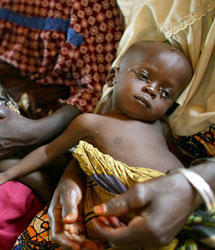Did You Eat Well Today...?

Alive Today,
Desperate Tomorrow
By Jeffrey D. Sachs
Tompaine.com
Go to Original
Friday 19 August 2005
Niger's food emergency has reached the world's headlines, but the crisis there is only one part of a much larger disaster. On an extended trip this summer through Asia, the Middle East and Africa on behalf of the United Nations, I visited countless villages afflicted with extreme hunger. Whether caused by drought, exhausted soils, locusts or lack of high-yield seeds, the results were the same: desperation, disease and death.
Incredibly, the actions of the richest countries - which promised solidarity with the world's poorest people at the G-8 Summit in July - have intensified the hunger crisis. Even today, donor governments' aid efforts respond to hunger emergencies such as Niger's with food relief, but fail to help with long-lasting solutions.
Expanding hunger reflects growing rural populations and inadequate food yields. Populations are growing because poor rural households choose to have many children, who work as farmhands and serve as social security for their parents. This intensifies poverty in the next generation, as average farm sizes shrink. Food yields are inadequate because these households lack inputs needed for modern and productive agriculture: soil nutrients, irrigation or other water-management techniques, improved seed varieties and sound agricultural advice.
The problem is especially severe in landlocked countries, where high transport costs leave villages isolated from markets, and in regions that depend on rainfall rather than river-based irrigation. Yields, on average, barely support survival, and crop failures are common and deadly, while long-term global climate change, caused mainly by high energy consumption in the rich countries, may be exacerbating the frequency and severity of droughts.
These impoverished villages need help to buy vital inputs for farming and to invest in basic infrastructure such as roads and electrification. Instead, donor governments and the World Bank have insisted for years that poor countries cut financing to these villages, under the guise of promoting “macroeconomic stability" - a polite way of demanding debt repayment - and reflecting the ideological delusion that the private sector will step in.
But these policies have left hundreds of millions of people even more desperately poor and hungry. Millions die each year, either of outright starvation or from infectious diseases that their weakened bodies cannot withstand.
The irony is that donors then respond with very expensive emergency food aid, which typically proves to be too little and too late. A shipment of an equivalent dollar amount of fertilizer and improved seeds from, say, the United States to Africa would yield perhaps five times more food.
If donors would implement this obvious and basic lesson, increased food yields could be turned into sustained economic growth. Rural households would be encouraged to have fewer children, and to invest more in each child's health and education. Child survival rates would rise, reinforcing lower fertility rates. At the same time, increased educational opportunities for girls and women, and low-cost contraceptives provided by family-planning services, would empower them to marry later and have fewer children.
Donors should simultaneously help impoverished countries to invest in roads, ports, rural electricity and diversified production, in order to promote higher productivity and alternative livelihoods in the longer term. Villages currently trapped in hunger and subsistence agriculture would become commercial centers for food processing and exports, and even for rural industry and services supported by electrification, mobile phones and other improved technologies.
This is a year of both widespread hunger and solemn promises by the rich countries. But emergency food aid is not enough. Donors should lend their support by backing long-term solutions aimed at increasing food production, slowing population growth and mitigating long-term global climate change.
Jeffrey Sachs is professor of economics and director of the Earth Institute at Columbia University.




0 Comments:
Post a Comment
<< Home